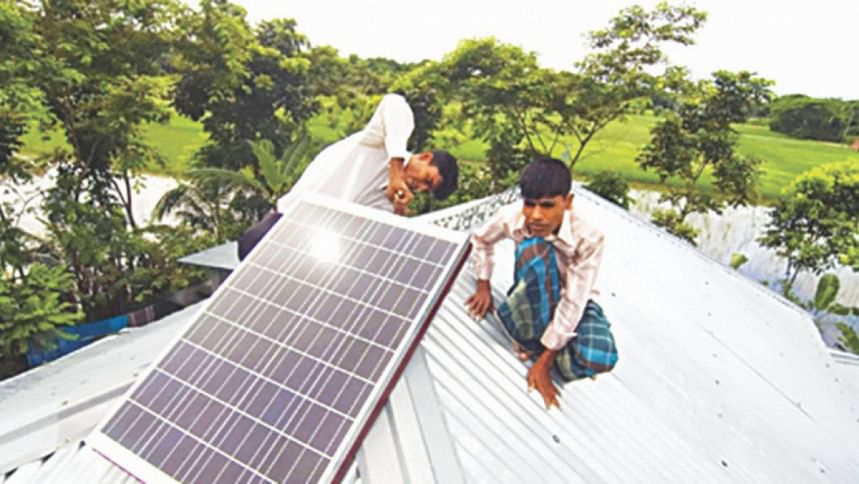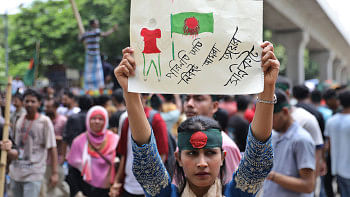Bangladesh lags behind in rooftop solar race

Despite significant potential for rooftop solar energy, Bangladesh has lagged behind in development, while Vietnam has emerged as a regional leader in the sector.
As of 2024, Bangladesh's total solar energy output stands at 1,084.55 MW, according to the Sustainable and Renewable Energy Development Authority. This includes 258 non-net-metered rooftop solar systems with a capacity of 88.451 MW, and 2,476 net-metered rooftop solar systems generating 111.732 MW.
In contrast, Vietnam produces 9,300 MW of rooftop solar energy out of a total solar capacity of 16,500 MW, making it the top solar energy producer in Southeast Asia, according to Vietnam Electricity.
Vietnam's total solar energy production is nearly equivalent to Bangladesh's entire power generation capacity.
A FAILED POLICY
Bangladesh introduced a policy in 2012 mandating new buildings to install solar panels for utility connections. However, experts have called it a failed initiative.
Khondaker Golam Moazzem, research director at the Centre for Policy Dialogue, criticised the policy as flawed and politically motivated, claiming it primarily served a specific political group.
"Many people installed low-quality solar panels just to obtain utility connections. As a result, most of these systems are now non-operational," said Moazzem, also an adviser to the Just Energy Transition Network Bangladesh.
BARRIERS
Lack of political will
Inadequate policy support
Unclear guidelines
Limited financial returns
Complex approval processes
This sentiment was echoed by users who admitted they installed rooftop solar systems solely to fulfil the utility connection requirement.
"The rooftop solar I installed is now non-operational. I only installed it to get a utility connection. For outages, we rely on the building's generator," said Arif Mollah, a resident of Bailey Road.
Consequently, many rooftop solar systems across Dhaka have fallen into disuse.
LACK OF COMMITMENT, SUPPORT
Experts attribute Bangladesh's stagnation to a lack of political will and inadequate policy support.
"We've never seen strong political commitment from previous governments, whereas Vietnam has shown remarkable dedication to renewable energy," said Moazzem. He said Vietnam boasts a well-established renewable energy supply chain, heavily supported by private sector investments, which Bangladesh lacks.
Bangladesh's net metering policies have also failed to gain traction.
Md Abul Kalam Azad, manager of the Just Energy Transition (JET) team at ActionAid Bangladesh, criticised the 70 percent capacity cap on renewable energy converters, which limits installations.
"This capacity limit needs revision to allow larger solar installations, making investments more attractive for residential and commercial users," said Azad, also the member secretary of JETnet-BD.
Shafiqul Alam, lead energy analyst for Bangladesh at the Institute for Energy Economics and Financial Analysis (IEEFA), highlighted the contrast between Bangladesh and Vietnam's policy environments.
RECOMMENDATIONS
- Proper standards
- Financial incentives
- Private sector engagement
- Robust policy framework
- Shift in mindset
"The Vietnamese government offered an attractive tariff for rooftop solar projects-- $0.0838/kWh of rooftop solar production. This rate was announced with a planned reduction after 2020, which triggered a significant surge in rooftop solar installations," he said.
He said high import duties on solar equipment in Bangladesh further hinder growth.
However, he expressed hope for a positive outcome from the government's recent decision to provide a full tax exemption for 10 years to promote renewable energy development in Bangladesh.
BARRIERS TO PROGRESS
Experts identified unclear guidelines, limited financial returns, and complex approval processes as key barriers to expanding rooftop solar in Bangladesh.
"The net metering policy is underdeveloped, with no clear compensation mechanism and capacity limitations on individual systems, making the investment less profitable," said M Zakir Hossain Khan, chief executive of Change Initiative and an adviser to JETnet-BD.
Zakir advocated for expanding Bangladesh's net metering system and streamlining approval processes to encourage urban households and businesses to adopt rooftop solar.
SREDA Chairperson Munira Sultana pointed out that a lack of awareness among users is a major reason behind the poor maintenance of rooftop solar systems.
"These systems are easy to maintain and can meet electricity demands. However, many remain unused due to a lack of awareness," she said.
Experts believe that with proper standards, financial incentives, and private sector engagement, Bangladesh could still harness its rooftop solar potential. However, this requires a shift in mindset and a robust policy framework.

 For all latest news, follow The Daily Star's Google News channel.
For all latest news, follow The Daily Star's Google News channel. 



Comments